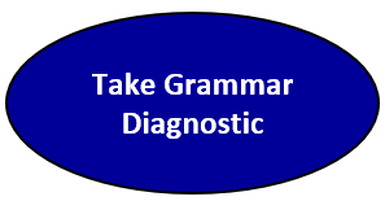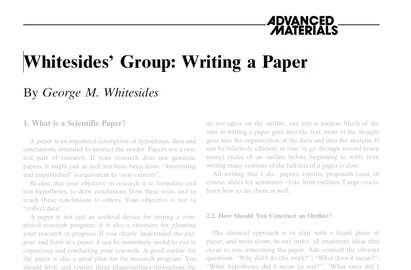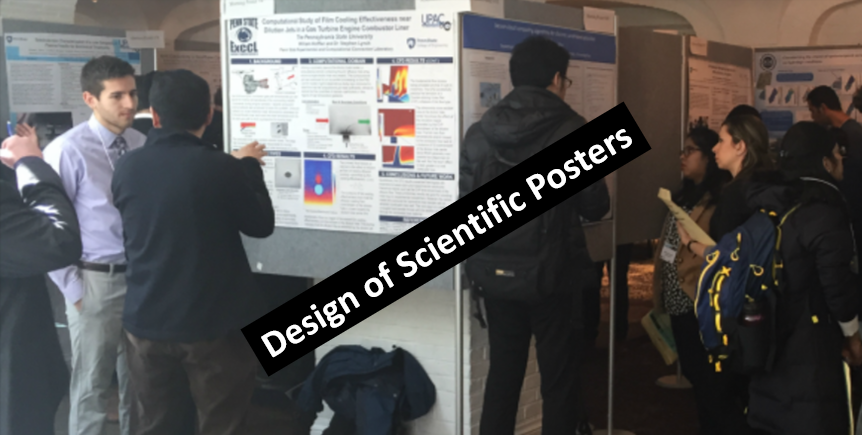Online REU Workshop: 27 July 2023
Writing About Your Research
|
This webpage introduces a free 1-hour workshop that teaches researchers, such as in a summer Research Experience for Undergraduates (REU) program, the expectations that audiences have for a scientific research paper or poster. In this workshop, you will learn the expectations that audiences have for the structure, illustration, and language of a paper or poster. As preparation for the workshop, you are to view the 20 minutes of short films given below. Then, during the workshop, you will take a Kahoot to demonstrate your understanding of the principles taught in the films. After the workshop, your REU site director will verification of your participation.
This workshop on research writing is taught by Professor Michael Alley from the College of Engineering at Penn State. The author of The Craft of Scientific Writing (Springer, 2018), Alley has been teaching these type of workshops for more than 20 years. |
Workshop Day and Times
You can take the 1-hour writing workshop on 27 July 2023 at either of the following times:
12:00 p.m. (EST) 9:00 a.m. (PST) Zoom
3:00 p.m. (EST) 12:00 p.m. (PST) Zoom
If you are a REU Site Director, you can register your site for the workshop or just send an email to Michael Alley letting him know about how many of your students will attend.
You can take the 1-hour writing workshop on 27 July 2023 at either of the following times:
12:00 p.m. (EST) 9:00 a.m. (PST) Zoom
3:00 p.m. (EST) 12:00 p.m. (PST) Zoom
If you are a REU Site Director, you can register your site for the workshop or just send an email to Michael Alley letting him know about how many of your students will attend.
Preparation Assignment for Workshop (about 20 minutes)
Research papers are organized differently from technical reports. In particular, audiences in engineering and science expect particular information to reside in certain parts of research papers. Film 1 explains the major expectations for the organization of research papers. In addition to expectations for the organization of research papers, expectations exist for the for the incorporation of illustrations, as discussed in Film 2. Films 3 and 4 discuss the two most important goals of sentences in science and engineering: being precise and being clear. Another important goal for language in scientific writing (connecting sentences) is presented in Film 5 and its accompanying handout. Finally, highlighted in the Kahoot below are errors of grammar, punctuation, and usage that commonly occur in engineering and science. For the errors that you miss in this Kahoot, please watch the corresponding films in Appendix B so that you can avoid those errors.
Research papers are organized differently from technical reports. In particular, audiences in engineering and science expect particular information to reside in certain parts of research papers. Film 1 explains the major expectations for the organization of research papers. In addition to expectations for the organization of research papers, expectations exist for the for the incorporation of illustrations, as discussed in Film 2. Films 3 and 4 discuss the two most important goals of sentences in science and engineering: being precise and being clear. Another important goal for language in scientific writing (connecting sentences) is presented in Film 5 and its accompanying handout. Finally, highlighted in the Kahoot below are errors of grammar, punctuation, and usage that commonly occur in engineering and science. For the errors that you miss in this Kahoot, please watch the corresponding films in Appendix B so that you can avoid those errors.
Appendix A: Additional Resources on Writing Process and Style
This appendix contains two short articles and four films that address additional perspectives of research writing. The first short article, written by the chemist George Whitesides, discusses the process of writing a scientific research paper as part of a team. Presented in the second short article are insights into the design of a scientific poster. The first short film, Film A-1, presents an analysis of audience for a research paper. Discussed in Film A-2 are strategies for making the writing concise at the sentence level. Film A-3 discusses the incorporation of equations, and discussed in Film A-4 is the controversial issue of when to incorporate the first person (I or we).
This appendix contains two short articles and four films that address additional perspectives of research writing. The first short article, written by the chemist George Whitesides, discusses the process of writing a scientific research paper as part of a team. Presented in the second short article are insights into the design of a scientific poster. The first short film, Film A-1, presents an analysis of audience for a research paper. Discussed in Film A-2 are strategies for making the writing concise at the sentence level. Film A-3 discusses the incorporation of equations, and discussed in Film A-4 is the controversial issue of when to incorporate the first person (I or we).
Appendix B: Avoiding Common Grammatical Errors in Scientific Writing
This appendix present short films that discuss common errors of grammar, punctuation, and usage that occur in scientific writing. Examples of these errors appear in the Kahoot of the preparation assignment. If you miss or do not understand an error in the Kahoot, you are encouraged to watch the corresponding film in this appendix. Films B-1 and B-2 discuss the errors of sentence fragments and grammatical run-ons, respectively. Discussed in Films B-3 and B-4 is the punctuation of commas. Films B-5 and B-6 discuss two aspects of usage that are challenging in scientific writing: what verb tense to choose and how to express numbers.
This appendix present short films that discuss common errors of grammar, punctuation, and usage that occur in scientific writing. Examples of these errors appear in the Kahoot of the preparation assignment. If you miss or do not understand an error in the Kahoot, you are encouraged to watch the corresponding film in this appendix. Films B-1 and B-2 discuss the errors of sentence fragments and grammatical run-ons, respectively. Discussed in Films B-3 and B-4 is the punctuation of commas. Films B-5 and B-6 discuss two aspects of usage that are challenging in scientific writing: what verb tense to choose and how to express numbers.
|
Film B-1. Grammar: Avoiding Fragments Film B-3. Punctuation: Two Important Rules for Commas in Scientific Writing. Film B-5. Usage: Verb Tense in Scientific Writing. |
Film B-2. Grammar: Avoiding Run-Ons. Film B-4. Punctuation: Third Important Rule for Commas in Scientific Writing. Film B-6. Usage: Expressing Numbers. |
References
- Michael Alley, The Craft of Scientific Writing, 4th ed. (New York: Springer, 2018).
Please feel free to provide comments, questions, and suggestions for the films, text, and quizzes of this website. To help us understand your feedback, please let us know whether you are a student or faculty member (or other professional).



